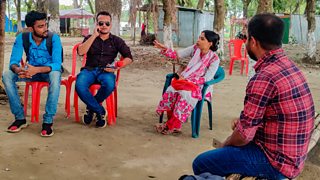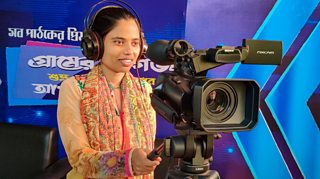A journalist with a vision - our work with PRIMED in Bangladesh
Shahrin Ahsan
Bangladesh project officer, media development
It isn’t often that we come across women in leadership roles in the media in Bangladesh.
While women represent nearly 50% of the world’s total population, we don’t have nearly the same representation in the industry. We do see women as presenters, anchors, and reporters, but their number is still disproportionate here in Bangladesh.
So, when 主播大秀 Media Action started working with Gramer Kagoj (Village Paper), a leading local daily newspaper in the southeast region of Bangladesh and one of two local partners supported through the programme Protecting Independent Media for Effective Development (PRIMED), it wasn’t completely surprising to find out that Sopna Debnath was the only female journalist there. Indeed, despite being the most popular daily in that region, this ‘voice of the village’ has a staggeringly low ratio of male-female employees - just four, compared to nearly 50 full-time male staff and nearly 200 local correspondents and contributors.
Part of the problem is that a reporter faces social, economic and cultural challenges to their job alongside their regular duties, especially in a rural context. For instance, local media outlets often fail to meet the work environment and salary expectations of potential candidates, and therefore they often are not an attractive proposition for young female professionals. It has always been difficult for a woman to survive and progress in a male-dominated industry, and despite much talk about women empowerment, gender equality, and equity, Bangladesh’s media outlets are far from fully embracing the idea to its core. The lack of policies, implementation challenges, and monitoring gaps intensify the scenario.

Sopna Debnath at work in her village in southeast Bangladesh. Photo: 主播大秀 Media Action Bangladesh
Huge inequality between men and women in media
The inequality is even more pronounced in the geographical divisions outside Dhaka or in rural areas.
The story of Sopna Debnath is inspiring because she beat all of these odds to pursue her dream of becoming a reporter, and PRIMED has been helping her achieve her full potential while also creating more opportunities for women at Gramer Kagoj.
A good student, always keen on extracurricular activities and volunteering, Sopna also engaged with different cultural groups, and she started working at Gramer Kagoj as a volunteer in 2019 because she wanted to learn something new. She always had the desire to reach as many people as possible through her work and make a difference in her community, so she didn’t let the challenges she faced as a young female reporter discourage her when she was starting.
Breaking the barriers - at home and in the field
For instance, being a female reporter is not well accepted by rural people; they have some misconceptions about how media outlets work, and she felt some resistance while gathering news. Also, being the only female reporter in the outlet has its own challenges. Media representatives often say it can be difficult to engage women in leadership roles in the newsroom because they find it difficult to combine this with the many responsibilities they usually maintain at home, and there is a lack of support and mentoring to help women to tackle challenges and discrimination.
Many female media practitioners remain at a junior or editor level, with correspondingly lower pay grades. Perhaps more critically, female journalists are often prevented from covering subjects considered the exclusive domain of male journalists – such as politics, sports, economy, and conflict. They may be pigeonholed in journalism roles, more often covering topics of a social nature or that are otherwise considered “feminine”.
This is deeply problematic and leads to an absence of women’s voices and perspectives on issues that directly and indirectly influence their rights. How incidents and decisions affect women, and what information they need to respond, should also be a critical component of coverage during any crisis, but this is often lacking from more traditional coverage.
This is where PRIMED works to help Gramer Kagoj draft, adopt and implement more gender-sensitive editorial guidelines and internal policies to make a difference. This work is geared towards ensuring more gender equality and adequate protection for female staff; it includes policies to deal with sexual harassment, the use of gender quotas in recruitment, and editorial policies aimed at improving gender balance and representation in content. At the same time, PRIMED has been providing training, mentoring, and networking opportunities to female journalists and other female media practitioners, to help mitigate the disadvantages they face in accessing senior and decision-making levels. We and our partners use a solidarity-based approach that positions men and women as agents of change, always including men in the debate.
'I want to tell stories that will bring real change'
As a result, the Gramer Kagoj representatives now have a better understanding of gender inclusion in content, be it written or audio-visual. They now make a conscious effort to make their content gender-sensitive, include more female voices, and produce content that considers the female audiences. They are in the process of developing editorial guidelines, and house practices have improved too. Now, Sopna Debnath can give her inputs more openly, and see herself reflected in the content more clearly.
“I love my role – that of a local news reporter – and would quit a comfortable job in any other organisation, because I want to tell stories that will bring real change. For me, this newspaper has been a turning point, because I know while I report, I’m talking about not just social issues and injustices, but also about values that our audiences will relate to and act upon!” says Sopna.
She also celebrates how PRIMED has helped in increasing reporters’ awareness, understanding, and engagement on issues that matter to women, while acknowledging there still is much to be done. She says that even though the editor and co-workers are very supportive and do not treat her differently from her other colleagues, she has always wished there were more female reporters like her, so she could work more comfortably. And this necessity is now also acknowledged by the senior management of the media house, who have realised the importance of having more female employees and have taken some conscious steps to include more female voices in their workforce.

Sopna Debnath, the first female journalist at Gramer Kagoj (Village Paper), is now expanding into presenting and filming. Photo: 主播大秀 Media Action Bangladesh
Including women in content and on staff
The paper has taken the 主播大秀’s 50:50 challenge, aimed at ensuring more women are included in content, and is also targeting local universities and cultural associations, circulating exclusive employment opportunities to attract more employees like Sopna Debnath.
“We always knew that having a balanced workforce is necessary for any organisation, But PRIMED has shed light on the ‘why’ it is important”, said Gramer Kagoj’s editor, Mobinul Islam. “Though we consciously try not to treat our female employees differently by favouring or discriminating against them in any way, now we have a better realisation of the things we need to do to truly minimise discrimination.”
In the meantime, Sopna keeps proving her commitment and dedication. She hasn’t confined herself to the role of a reporter but has also started working as a presenter and as a digital content maker, hopefully paving the way for more women.
Inspiring through better representation
Gender norms are a constant subtext, where breaking gender stereotypes and examining non-traditional career options for women is challenging. The media sector is special because it tells important stories, while walking the tightrope between entertainment and achieving social impact. Mainstreaming gender equity at both the content and outlet level is a strategic priority of PRIMED and 主播大秀 Media Action, and we are addressing this issue at both policy and implementation levels.
With public interest media under threat around the world, we are committed to continuing our efforts to ensure that women’s voices are meaningfully represented - throughout media organisations, and in the content they produce – to properly reflect the audiences they serve. Our vision is to create an environment so that more women like Sopna are inspired to pursue this as a career.
--
Shahrin Ahsan is project officer, media development for 主播大秀 Media Action in Bangladesh.
Learn more about our media support consortium Protecting Independent Media for Effective Development (PRIMED). PRIMED is funded by the Foreign, Commonwealth and Development Office.
